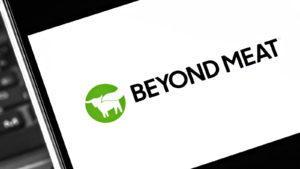Nearly half of all U.S. restaurants offer it, with many more likely to follow. Better, according to the Plant Foods Association, over the next year, plant-based menu items could increase by about 400%. We also have to consider that about 70% of all U.S. consumers eat plant-based food at the moment, as compared to 66% in 2022.
In addition, according to Bloomberg, the market could make up about 7.7% of the global protein market by 2030, valuing it at about $162 billion.
Plus, as I noted on June 21, “The vegan supplements market could surge to $13.6 billion by 2028. The plant-based milk market could soar to $51.87 billion by 2023, says The Brainy Insights. The vegan cheese market could be worth more than $8 billion by then, as well, says MarketResearch.biz.”
Even the plant-based meat market could soar to $5.25 billion by 2029 from $5.25 billion in 2023. All of which creates massive opportunities for plant-based meat stocks such as:
Beyond Meat (BYND)

Beyond Meat (NASDAQ:BYND) is one of the most hated vegan stocks on the market.
Poor earnings, guidance, debt and underwhelming demand have weighed heavily on the stock. However, I’d buy it at current prices for two reasons.
One, it’s technically oversold. Not only is BYND sitting at strong support dating back to Nov. 2023, but it’s also over-extended on RSI, MACD and Williams’ %R. In fact, if you pull up a two-year chart, you’ll see that every time it hits its $6 support level with those oversold indicators, it bounces higher shortly after.
Two, with all of the hatred and 38.17% short interest in the stock, it may pay to be a contrarian.
As Investorplace contributor Josh Enomoto recently noted, “By going contrarian, you can potentially help squeeze out the bears, who may panic out of their positions. Doing so may create a positive feedback loop that could inspire more short covering, thus driving up shares.”
Ingredion (INGR)

Ingredion (NYSE:INGR) may not be a pure play on the vegan meat market.
It’s better known for starches and sweeteners. However, it has been increasing its selection of plant-based patties, seafood and chicken to meet growing demand. Making it even more attractive, INGR yields 2.60% and just paid out a 78-cent dividend on July 23.
Also, earnings haven’t been too shabby. While its first quarter revenue of $1.88 billion was 6.6% below estimates, its earnings per share of $3.29 jumped from $2.89 year over year. The company also raised its guidance for full-year EPS to a range of $10.35 to $11. It also raised its adjusted EPS estimate to a new range of $9.20 to $9.85.
Even better, the company expects global customers to drive growth and sees greater customer engagement in its texture solutions business. The company added, “We anticipate deploying cash this year toward organic investments, dividends, and a step-up in share repurchases.”
Bunge Global (BG)

While Bunge (NYSE:BG) is not a pure play on the vegan market either, it does offer the ingredients used in meat and dairy alternatives. It also carries a yield of 2.43% and will pay out a dividend of 68 cents on Sept. 2 to shareholders of record as of Aug. 19. Following that, it’ll pay 68 cents on Dec. 2 to shareholders of record as of Nov. 18.
In addition, as noted by Investorplace contributor Hope Mutie, “Despite falling short of expectations by posting a smaller-than-expected drop in first-quarter profits and maintaining its 2024 outlook for annual adjusted earnings at $9 per share, down from $13.66 last year, the company’s share price still surged by over 11% YTD.”
At the moment, four analysts rate BG as a moderate buy with an average price target of $108.33. The highest price target at the moment is $120.
While there’s a lot to like with BG, I’d wait for the stock to pull back first. At the moment, it’s technically overbought at double-top resistance. It’s also over-extended on RSI, MACD and Williams’ %R and could easily drop again. Also, if you pull up a five-year chart, you’ll see it’s been bouncing around in a channel between $85 and $112 since early 2022.
On the date of publication, Ian Cooper did not have (either directly or indirectly) any positions in the securities mentioned. The opinions expressed in this article are those of the writer, subject to the InvestorPlace.com Publishing Guidelines.
On the date of publication, the responsible editor did not have (either directly or indirectly) any positions in the securities mentioned in this article.
Ian Cooper, a contributor to InvestorPlace.com, has been analyzing stocks and options for web-based advisories since 1999.
